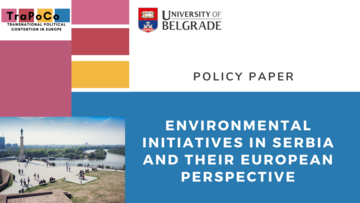Environmental initiatives in Serbia and their European perspective
The environmental movement in Serbia has been developing rapidly in recent years. This was to a large extent the consequence of the expansion of local and grassroots initiatives that succeeded in mobilising a significant number of citizens in street protests and through other forms of organised collective actions in making their claims over environmental problems they were faced with. The success of these citizen-led initiatives was significant to the extent that they even managed to exert enough pressure on decision-makers at national level and make them comply with their demands. However, despite some recent successes, environmental movements in Serbia, and especially grassroots initiatives, face several challenges in the long-term perspective, especially when it comes to their sustainability.
The EU has already done a lot in providing support to the advancement of the civil society sector and to environmental initiatives within the Enlargement region, creating a concrete plan in terms of changing legislation, strengthening the capacity of CSOs, and encouraging the development of deliberative decision-making mechanisms between central governments and the non-governmental sector. However, the role of the EU is still important in supporting the development of the environmental movement in Serbia and in the Western Balkans region. One of the pathways is the reliance on the existing mechanism of Europeanisation (transnationalisation) to develop and put in place an effective system of environmental decision-making from below. The paper provides a series of policy recommendations towards the achievement of this goal.
The document was discussed on the occasion of the policy event Civil society, political contention and European enlargement, held on March 2, 2023 at the University of Belgrade.
By: Jelena Pešić and Jelisaveta Vukelić, University of Belgrade
Language: English


